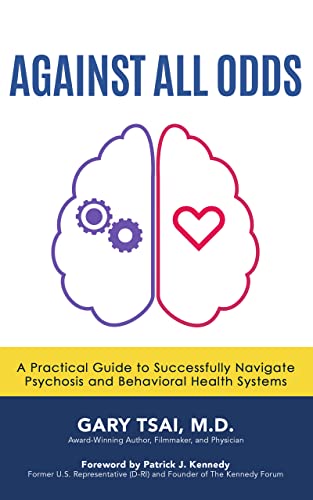
(8-3-22) Summer is prime reading time and although books about mental illnesses are not usually on a beach read list, I have asked the authors of books that have crossed my desk recently to tell us why they wrote their book and give us a sample chapter.
Against All Odds: A Practical Guide to Successfully Navigate Psychosis and Behavioral Health Systems
By Gary Tsai, M.D. (Book website: click here.)
For nearly three decades, my family struggled to get help for my mom. She was a loving mother and brilliant scientist, and happened to have schizophrenia and anosognosia, a condition whereby the area of the brain responsible for self-reflection is damaged, causing someone to lack awareness of their condition.
Unsurprisingly, it was extraordinarily difficult to get her to agree to accept treatment for a condition she fundamentally did not believe she had.
More surprisingly, since this is a rather common phenomenon that affects 40 – 50% of people with serious mental illness, the system responsible for providing care for her was not designed to do so and seemed nearly impossible to access. While in most areas of healthcare, the quicker and easier it is to access services the more severe the condition is, we quickly found out that the opposite was true in mental health systems.
The path to recovery for my family ultimately involved me going to medical school, becoming a psychiatrist, and eventually developing systems-level insights from the “inside” as an administrator of one of the largest behavioral health systems in the country. It shouldn’t be this difficult.
These challenges led me to author to de-mystify serious mental illness (SMI) and the systems responsible for its care. A fundamental goal is to distill complicated topics into simplified concepts and address the most common challenges and considerations confronting people with SMI and their caregivers, including:
- How to approach impacted loved ones and strategies to deal with resistance
- Understanding behavioral health systems, policies, programs, laws, practitioner types, and payors/insurance
- Identifying a good clinician or care team
- Caregiver strategies to be an effective advocate
- Self-care for caregivers
What makes the book unique is its systems-level approach to understanding the landscape of behavioral health systems, laws, programs, and practitioners, with a perspective informed by someone who is a system administrator for one of the largest behavioral health systems in the country, with in-depth clinical knowledge of SMI as a psychiatrist and addiction specialist, and as a someone with lived experience as a family member with schizophrenia.
Against All Odds is written to fast-track the trial-and-error process that many caregivers undergo to eventually become de facto experts in navigating mental health systems. From someone who has walked the journey to those going through the journey now, I hope Against All Odds will be a helpful resource for people with SMI, their caregivers, and those seeking to better understand behavioral care and systems.
Please visit my webpage to learn more.
Excerpt from Against All Odds. (Reprinted with permission of the author.)
Chapter Three
To address and cope with psychosis and serious mental illness, one must understand both the condition as well as the programs and system within which it is treated. The deepest understanding is attained when “textbook” comprehension is combined with knowledge acquired through lived experience—when you are affected personally or experience it by proxy via a friend or family member.
With decades of experience as a family member of a loved one with schizophrenia, and as a psychiatrist, this chapter consolidates my personal and professional experiences related to two of the most challenging aspects of managing serious mental illnesses: 1) engaging loved ones and overcoming resistance to treatment; and 2) self-care.
It is important to understand what someone with psychosis is experiencing in order to develop effective approaches to engage them.
Let’s start with the basics—namely, the brain. It is our command center. Our brain tells us how to think, feel, and behave. It is the primary way we perceive the world via our five basic senses: sound, sight, smell, touch, and taste. In short, our brain determines our reality.
In most cases, the reality constructed by our brain is consistent with the reality of others around us, and there is shared agreement about that reality. In the case of a brain experiencing psychosis, this reality is distorted due to misfiring from some of the billions of brain cells, called neurons, connected to one another via trillions of synapses in the brain. These synaptic connections between neurons form brain pathways that govern overall brain activity. Certain damaged brain pathways are more relevant to psychosis than others.
If one thinks of the brain as the engine of a car, this particular car engine is extraordinarily complex with a plethora of moving parts. With more parts, there are also more opportunities for things to go wrong. The brain typically undergoes a process of self-maintenance called synaptic pruning to get rid of unnecessary neurons and preserve those needed for brain pathways that serve critical functions. However, this pruning process can go awry and either get rid of neuronal connections that are important to keep, or maintain things that should be removed. It has been suggested that errors in synaptic pruning may contribute to schizophrenia risk.
Usually, when someone hears a bird chirping, their ears pick up the sound and transmit it to their brains. This activates the auditory pathways of the brain to let the person know that they are hearing something. When someone with schizophrenia experiences auditory hallucinations and hears voices that others cannot hear, the brain’s auditory center responsible for hearing is misfiring and inappropriately activated in the absence of sound.
This results in the individual hearing something because their brain tells them they’re hearing something, even though there is no external stimulus. This has been validated by imaging studies of the brain that show the auditory centers being activated while someone is hallucinating, even though there was no external stimulus. This is why auditory hallucinations are so real to the people experiencing them and are not “made up”—because their brain is undergoing the same process as what happens when there is an external noise… Given the complexity of serious mental illnesses and the intricacies of accessing care, a single intervention or strategy is rarely effective. Effective interventions often require multiple approaches that work synergistically with one another to increase the likelihood of a positive outcome.
With this in mind, two critical focus areas to optimize outcomes for individuals with serious mental illness are:
- Effective approaches to treat and support impacted individuals and caregivers and
- Knowledge about behavioral health systems, programs, laws, practitioners, and payers to facilitate successful navigation of these complex components of seeking care.
Read more at my webpage.
About the author: Dr. Gary Tsai is a physician board certified in psychiatry and addiction medicine based in the Los Angeles area. When not with his family or working, he can be found playing basketball, flag football, and recovering from injuries with other weekend warriors. 
Recommended by Dr. E. Fuller Torrey:
Dr. Tsai has provided a concise and extraordinarily useful book for individuals with serious psychiatric disorders and their families. His overview of behavioral health systems including treatment settings, laws, types of practitioners, and insurance coverage, is the best description I have seen.



